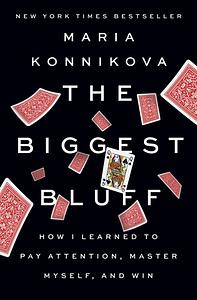Take a photo of a barcode or cover
366 reviews for:
The Biggest Bluff: How I Learned to Pay Attention, Master Myself, and Win
Maria Konnikova
366 reviews for:
The Biggest Bluff: How I Learned to Pay Attention, Master Myself, and Win
Maria Konnikova
3.5 - I listened to the audiobook and think it would have been a 4 if I read it instead. I liked the tie in to broader human behavior and our understanding of how much of life we can control - Lots of interesting psychology studies explained nicely for the lay person, but a bit repetitive.
funny
informative
medium-paced
Nonfiction work on psychology of chance and fortune in the story of a psychologist learning to be a poker great - interesting and steady paced. Enjoyed way more than expected!
adventurous
funny
informative
inspiring
reflective
slow-paced
Very interesting story about poker, and I loved all the psychological tips and stories and logic fallacy references
informative
inspiring
reflective
medium-paced
informative
medium-paced
There was little doubt that I was going to pick up this book given my love of Texas Hold'Em — but Maria Konnikova's latest isn't some poker guide to get you to the WSOP. It's part memoir, self-help guide and business read from an accomplished non-fiction author and regular contributor to the New Yorker who happens to hold a Ph.D. in psychology.
She will dedicate herself to mastering the game under the tutelage of Poker Hall of Famer Erik Seidel and a host of other poker luminaries. She will make the trek into New Jersey to camp at coffee shops to play online, building up to runs in Las Vegas, Monte Carlo and Macau. But the hook, the reason you should read this even if you don't know what wins between Broadway and the nut flush, is it's all about poker as insight.
In poker, as in life, you are forced to make tough decisions armed with imperfect information. And to the careful observer, how we think through these problems hand by hand reveals a lot about your personality, your baggage, your biases, and more.
Erik Seidel early on gives Maria two critical words of advice: Pay Attention. Less certainty, more inquiry. Question everything, stay open minded and adjust as needed. Relevant on and off the felt, especially in this fraught and fearful moment. There are no perfect answers. It's about finding comfort in, and living with that uncertainty. And accepting that you can do everything right and still lose. That chance and fate are always lurking in the background ready to flush us down the river when we least expect it. I mean Maria was supposed to launch this book to coincide with her run at the 2020 World Series of Poker. A perfect marketing one-two punch that ran head first into a worldwide pandemic that had other plans.
You assess and readjust. No bad beats allowed. Good poker demands you shake it off, stay focused and continue to make strong decisions based on available information. Steer clear of superstition, notions of what you're due for, and staying blind to your own biases. Good poker play models effective behaviours in the real world. I'm all in.
She will dedicate herself to mastering the game under the tutelage of Poker Hall of Famer Erik Seidel and a host of other poker luminaries. She will make the trek into New Jersey to camp at coffee shops to play online, building up to runs in Las Vegas, Monte Carlo and Macau. But the hook, the reason you should read this even if you don't know what wins between Broadway and the nut flush, is it's all about poker as insight.
In poker, as in life, you are forced to make tough decisions armed with imperfect information. And to the careful observer, how we think through these problems hand by hand reveals a lot about your personality, your baggage, your biases, and more.
Erik Seidel early on gives Maria two critical words of advice: Pay Attention. Less certainty, more inquiry. Question everything, stay open minded and adjust as needed. Relevant on and off the felt, especially in this fraught and fearful moment. There are no perfect answers. It's about finding comfort in, and living with that uncertainty. And accepting that you can do everything right and still lose. That chance and fate are always lurking in the background ready to flush us down the river when we least expect it. I mean Maria was supposed to launch this book to coincide with her run at the 2020 World Series of Poker. A perfect marketing one-two punch that ran head first into a worldwide pandemic that had other plans.
You assess and readjust. No bad beats allowed. Good poker demands you shake it off, stay focused and continue to make strong decisions based on available information. Steer clear of superstition, notions of what you're due for, and staying blind to your own biases. Good poker play models effective behaviours in the real world. I'm all in.
I like the balance she struck between numbers/logic and psychology. Fascinating read.
inspiring
reflective
medium-paced
I was so excited to read this book since Konnikova is my favorite science writer and this book didn't disappoint. It's a blend of memoir and science writing (mostly psychology with some econ thrown in) and even though I barely know anything about poker (but a lot about psychology), I really enjoyed it. She intersperses research, poker tips, and her own experience seamlessly, and I especially liked her analysis of her own decision-making shortfalls and connecting those deficits to things in the research (especially things she had studied herself). It's a solid book to read a chapter at a time, and I'd recommend it to anyone who is looking for science writing or a book about learning poker.
I received an ARC in exchange for an honest review!
I received an ARC in exchange for an honest review!




